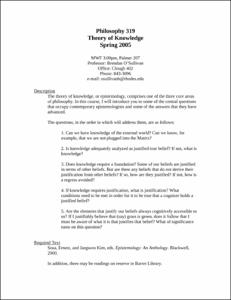Please use this identifier to cite or link to this item:
http://hdl.handle.net/10267/3506Full metadata record
| DC Field | Value | Language |
|---|---|---|
| dc.contributor.author | O'Sullivan, Brendan | - |
| dc.date.accessioned | 2009-02-26T17:43:42Z | - |
| dc.date.available | 2009-02-26T17:43:42Z | - |
| dc.date.issued | 2006-01-11 | - |
| dc.identifier.uri | http://hdl.handle.net/10267/3506 | - |
| dc.description | This syllabus was submitted to the Rhodes College Office of Academic Affairs by the course instructor. | en_US |
| dc.description.abstract | The theory of knowledge, or epistemology, comprises one of the three core areas of philosophy. In this course, I will introduce you to some of the central questions that occupy contemporary epistemologists and some of the answers that they have advanced. The questions, in the order in which will address them, are as follows: 1. Can we have knowledge of the external world? Can we know, for example, that we are not plugged into the Matrix? 2. Is knowledge adequately analyzed as justified true belief? If not, what is knowledge? 3. Does knowledge require a foundation? Some of our beliefs are justified in terms of other beliefs. But are there any beliefs that do not derive their justification from other beliefs? If so, how are they justified? If not, how is a regress avoided? 4. If knowledge requires justification, what is justification? What conditions need to be met in order for it to be true that a cognizer holds a justified belief? 5. Are the elements that justify our beliefs always cognitively accessible to us? If I justifiably believe that (say) grass is green, does it follow that I must be aware of what it is that justifies that belief? What of significance turns on this question? Required Text | en_US |
| dc.language | English(United States) | - |
| dc.language.iso | en_US | en_US |
| dc.publisher | Memphis, Tenn. : Rhodes College | en_US |
| dc.relation.ispartofseries | Syllabi CRN | en_US |
| dc.rights | Rhodes College owns the rights to the archival digital images in this repository. Images are made available for educational use only and may not be used for any non-educational or commercial purpose. Approved educational uses include private research and scholarship, teaching, and student projects. For additional information please contact archives@rhodes.edu. Fees may apply. | - |
| dc.subject | Philosophy, Department of | en_US |
| dc.subject | Syllabus | en_US |
| dc.subject | Curriculum | en_US |
| dc.subject | Academic departments | en_US |
| dc.subject | Text | en_US |
| dc.subject | 2006 Spring | en_US |
| dc.title | PHIL 319-01, Theory of Knowledge, Spring 2006 | en_US |
| dc.type | Syllabus | en_US |
| Appears in Collections: | Course Syllabi | |
Files in This Item:
| File | Description | Size | Format | |
|---|---|---|---|---|
| 2006_sp_PHIL_319-01.pdf | 55.31 kB | Adobe PDF |  View/Open |
Items in DSpace are protected by copyright, with all rights reserved, unless otherwise indicated.